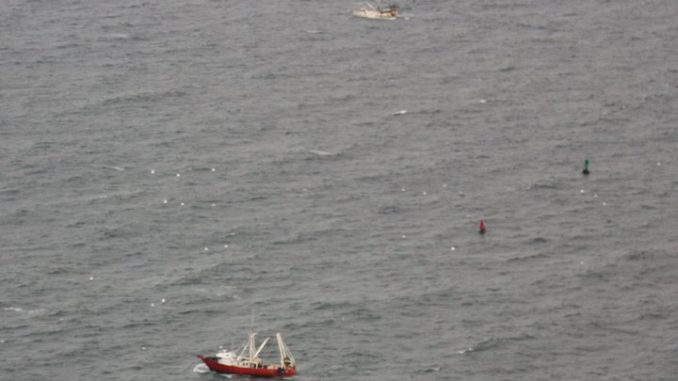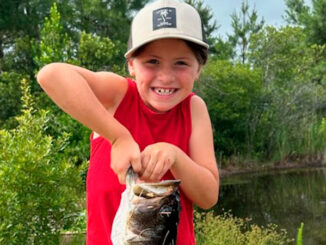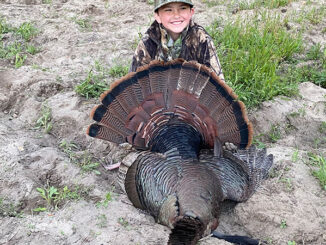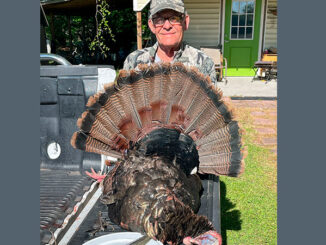
For the second time in less than a month, commercial trawl boats last week killed and dumped either (a) hundreds or (b) thousands of dead striped bass off the Outer Banks.
Different reports of the kill total are in disagreement.
In either case, taking advantage of a two-day re-opening of the trawl netting season by the North Carolina Division of Marine Fisheries, the trawlers swept through schools of striped bass Feb. 3-4 off the northern beaches of Cape Hatteras National Seashore.
Last Thursday (Feb. 3), they left hundreds (or thousands) of dead fish in their wake, in violation of a DMF proclamation created in January. To read a post about this on the Offshore Fishing Forum or to leave a comment click here.
On Jan. 20, DMF Executive Director Louis Daniel changed commercial fishing regulations after huge striped bass discards by trawlers, who littered the ocean with dead fish Jan. 15-16 near Oregon Inlet. Instead of a 50-biggest-fish haul, Daniel’s proclamation legalized a 2,000-pound trip limit per boat and transfer of excess, legal-size fish from one trawl boat to another on the water.
“It is incumbent upon all fishermen — commercial and recreational – to use common sense in the way they fish,” noted a DMF news release at the time. “Commercial trawl fishermen should limit their tow times to avoid overburdened nets. Recreational fishermen should practice ethical angling techniques. Fishing responsibly today will help ensure there will be fish in the future.”
It appears the North Carolina-based trawl fleet paid little attention to Daniel’s words.
DMF Public Information Officer Tricia Smith said Daniel was frustrated with the actions of the trawl fleet. But, she said, no one with the DMF’s Marine Patrol issued tickets for the apparent high-grading and discarding of legal or undersized striped bass (which remains legal).
Apparently there also is disagreement about the number of stripers killed. Smith said Marine Patrol officers counted 251 total dead stripers in the latest carnage, 200 by a helicopter survey and 51 washed ashore at Pea Island on Thursday (Feb. 3) plus 25 on Friday (Feb. 4).
“The highest concentration was from one-half mile (south of Oregon Inlet) to 1 1/2 miles from the ‘Boiler’ at Pea Island,” she said.
The Feb. 3 aerial survey lasted 75 minutes, she said.
Smith also noted many of the fish were “undersize” (legal length 28 inches). DMF regulations call for undersized stripers to be returned to the ocean, no matter their condition.
“(What the officers saw) appeared to be indicative of culling from trawl-fishing activities, but 60 percent were under the legal size limit,” Smith said.
However, in an Internet story about the latest striper kill, a different observer in a separate helicopter said he saw “thousands” of dead stripers covering an area of ocean 1- to 1 1/2- miles wide by 3- to 5-miles long, before the DMF chopper arrived.
A charterboat captain in the same story said he’d picked up many striped bass much larger than the 28-inch-long legal limit, some weighing as much as 38 pounds.
Ironically, the DMF, in reporting January’s trawler striper kills, said it also counted 250 dead stripers on the ocean. However, recreational fishing-boat witnesses reported many more floating dead or injured fish.
Smith said Daniel may pose a “hook-and-line commercial fishery” recommendation for striped bass, which would eliminate the discard kills caused by trawling. The topic will be discussed Thursday and Friday (Feb. 10-11) at the MFC meeting in Pine Knoll Shores at the Clam Digger Inn.
Local charterboat captains are reluctant to talk about the kill because, said Oregon Inlet Fishing Center official Bambi Scarborough, “many of them are commercial fishermen, as well, and live here.”
One charterboat skipper, contacted upon Scarborough’s recommendation but who wished to remain anonymous, said, “I don’t want to talk about that (fish kill). I ain’t got nothin’ to say to nobody about it.”
When asked if he felt he would be threatened or harassed by local commercial fishermen if he talked about what he’d witnessed Feb. 3, the captain said, “No, but I ain’t talking to you about this.”





Be the first to comment